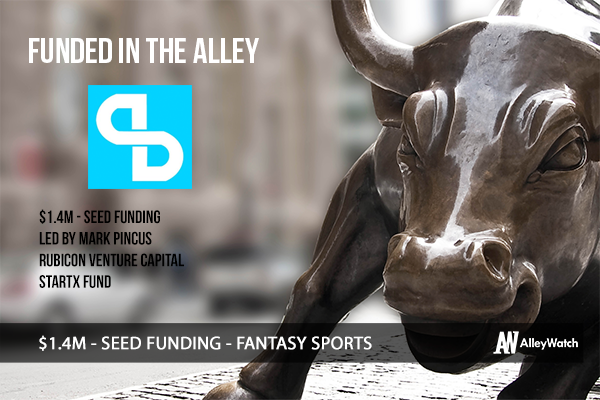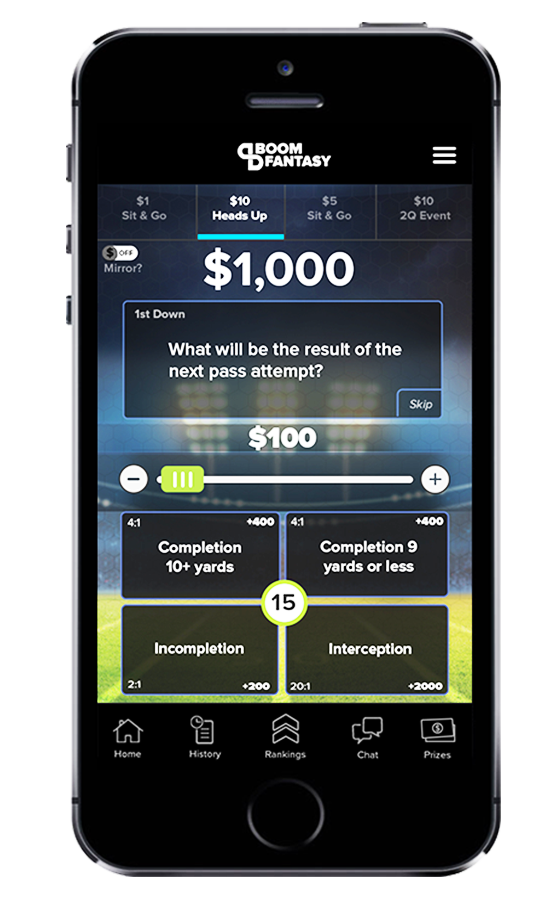It’s 4th & 1 and Eli has to go for it. Is he gonna make it? As you sit around the TV with your strong opinions, why not put your money where your mouth is and make the game a little more exciting! With Boom Fantasy this is a reality. With other fantasy platforms not letting you take action midgame, Boom Fantasy is giving you something to do during the game.
With a new round of funding under their belt, CEO Stephen A. Murphy talks about securing a place in the fantasy sports world as well as how Boom Fantasy is making sports a little more interesting.
Who were your investors and how much did you raise?
We raised a seed round of $1.4 million. Our largest investors were Zynga CEO Mark Pincus, the Stanford University-StartX Fund, and Rubicon Venture Capital. We also have several prominent angel investors with expertise in mobile gaming and technology.
Tell us about your product or service.
Boom Fantasy is a sports technology platform where players can compete with other fans for real money while watching a game. We have created what we are calling in-game fantasy sports; instead of drafting a lineup, you predict what’s going to happen next in a game. Will Peyton Manning throw for 20 yards on this drive? Will Adam Vinatieri make this 50-yard field goal? Based on your knowledge of the game, you can beat other fans and win money.
What inspired you to start the company?
I’ve been involved in real-money gaming for a decade, and I watched closely as daily fantasy sports exploded as an industry. While I believe FanDuel and DraftKings are exceptional products, I knew there was an untapped market out there that wanted to play, but was intimidated by all the numbers and game stats that are required to win in daily fantasy sports.
How is it different?
It is completely different. This is not another DraftKings clone. There are no lineups; there are no salary caps, there are no drafts. While watching a game, we will push several simple questions to you and other fans. You predict what’s going to happen and if you’re good at it, you can win some money in the process.
What market you are targeting and how big is it?
Nearly 60 million people play season-long fantasy sports. We believe we can provide a fantasy game that has the same social and interactive elements they love about season-long, but with the immediacy and instant gratification that daily fantasy sports provide.
What’s your business model?
Players buy into our fantasy sports leagues for a specific entry amount. Nearly 90% of those entry fees go directly into the prize pool; we take a small administrative fee. With volume – and we’ve already run thousands of tournaments, it becomes a very compelling revenue opportunity.
After football which sport has the most promise as a fantasy sports market?
Baseball is the most popular sport after NFL today. But we think other sports will be more entertaining with this kind of in-game play. We want to offer all sports – from baseball to hockey to even sumo wrestling.
What was the funding process like?
My co-founder Assaf Einat and I both graduated from Stanford University’s MBA program, so we tapped into the Silicon Valley ecosystem first. However, we have added a couple great New York investors and our leading venture capital firm, Rubicon, has a strong presence in New York.
What are the biggest challenges that you faced while raising capital?
Real-money gaming isn’t an area that a lot of investors invest in often, so there was some education required.
What factors about your business led your investors to write the check?
I think it was a combination of a huge market, an experienced founding team, and a product with some very promising early metrics that made investors want to participate.
What are the milestones you plan to achieve in the next six months?
Just a few weeks ago, we launched our real-money product in 12 U.S. states, so that was very exciting. We are looking forward to March Madness, MLB’s Opening Day, and the Olympics. We look forward to expanding to more states in the U.S. in 2016.

What advice can you offer companies in New York that do not have a fresh injection of capital in the bank?
As a first-time entrepreneur, I don’t know how qualified I am to give advice. However, I will say that even if we didn’t raise money, I still would’ve been scratching and clawing to try to make this a reality. I believe in-game engagement and real-time predictions will be a part of how most people watch sports years from now. I was willing to devote my energy and career to it, whether or not we could secure a significant seed round. So I think that belief in what you want to do and what you want to build is critical, and with that conviction you’ll be more successful in acquiring the resources necessary to make it happen.
Where do you see the company going now over the near term?
We want to continue to be the market leader of in-game fantasy sports. This is a new industry that we are trying to own. Yes, it shares some characteristics with daily fantasy sports and season-long fantasy sports, but we believe it will become an industry in its own right and we want to make sure we continue to grow the market.
Where is your favorite bar in the city for an after work drink?
I’ve got a seven-month-old baby (name Scarlett Shea, after the old Mets stadium), so I don’t really go to any bars in the city anymore. But back in my younger days, I loved Dive 75 on the UWS or Rudy’s in midtown if I was feeling particularly rebellious.





